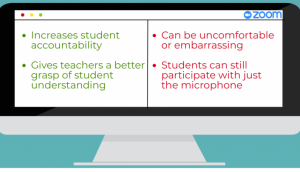PRO
October 27, 2020
During the first weeks of online school, many RHS teachers requested that all students keep their Zoom cameras on during class, prompting concerns over student privacy.
In order to ensure student presence and to improve student engagement and understanding, MCPS should permit teachers to require that students activate their cameras during meetings.
In most online classes, teachers take attendance while students are entering the meeting. For the remainder of time, they instruct their lesson and occasionally ask the class questions, often being met with long periods of silence.
In this virtual setting, where students have the ability to keep their cameras off, they are marked present solely for joining the meeting. There is no guarantee that students are actively paying attention in class or even in front of their computer, unless they enable their cameras or participate during class discussions—which very few do.
Additionally, during classes, teachers need to be able to monitor student engagement and understanding. By utilizing websites like Nearpod or Padlet, many teachers have found alternative ways to gauge student progress without requiring cameras. These sites allow teachers to ask questions, which students answer through typed responses. However, participants often experience issues accessing the material, making these websites inadequate replacements for teachers to see students’ advancement.
Considering the lack of student engagement during class discussions, enabling cameras would be an important backup for teachers to see if students understand lessons when apps like Nearpod fail, as they can view their facial expressions.
Finally, online classes are as new and uncomfortable for teachers as they are for students. Teachers are accustomed to the traditional classroom and seeing students in person, walking around the classroom and being able to talk to students one-on-one. This adjustment has not been easy for anyone, and is especially difficult for teachers to teach while staring at a sea of black boxes.
“As a teacher, I’m much better able to read a room, notice body language, observe expressions and interactions when I can see students face-to-face. I miss being able to do that in the virtual setting, especially when students don’t turn on their cameras,” biology teacher Fariha Khan said.
Student privacy is a valid concern, but MCPS addressed the issue of student privacy before online classes began. Students who are adamant about keeping their cameras off can opt-out of being recorded through having their parents sign a waiver form on ParentVue.
Additionally, to address students’ technological needs, MCPS is providing chromebooks—which are equipped with cameras—to all MCPS students. Therefore, if a teacher asks for the entire class to turn on their cameras, all students are capable of obtaining the technology that will allow them to comply.
Teachers know how to best teach their classes and should be able to dictate how they operate, both in-person and from a distance. Some students may not like having their cameras on durings Zooms, but if their teacher feels it is essential to effectively learning online, they need to opt-out or acquiesce.




